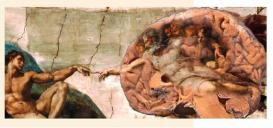Since the proclamation of the "Decade of the Brain" in the 1990s, the neurosciences worked a triumphant success without precedent. Far beyond the boundaries of the natural sciences, explanatory models arising from brain research are currently invading the fields of social sciences and the humanities. There is scarcely a science discipline resistant to the attempts of being modernized by the “neuro-“ prefix, leading to the epidemic emergence of novel neuro-disciplines such as neurospirituality, neurotheology, neurophilosophy, neuroethics, neuroeconomics, neuromarketing, neuropsychoanalysis, neuroanthropology, neuroeducation, and neuroaesthetics, to name but a few. Common to all these novel neuroscience fields is the intention to generate experimentally verifiable and objectifiable data by implementing brain research methods, first and foremost by use of neuroimaging techniques. According to the sociologist Nikolas Rose, we increasingly perceive our ontological identity as being neurochemical selves.
Are we our brains? Biological automata, simply executing stimulus-dependent reaction schemata within the framework of pre-determined brain processes? Are we currently about to transform Foucault’s Discipline and Punish into a forensic-psychiatric "Screen and Intervene," aiming at finding biological markers predicting criminal behavior and to ultimately provide neuroscientific methods to govern risky brains? The book- and multimedia project Neuromythology aimed at elucidating the historical background of the current neuro-hype in both science and the media, and discusses the consequences of an increasing neuroculturalization of society.

